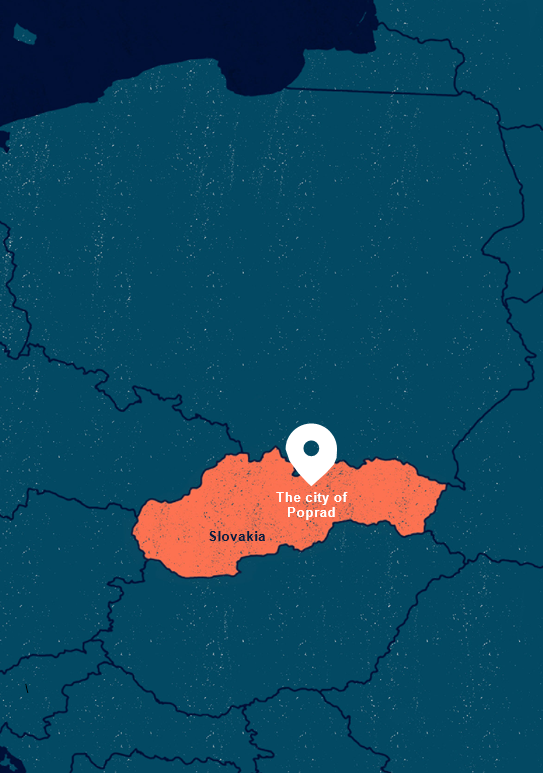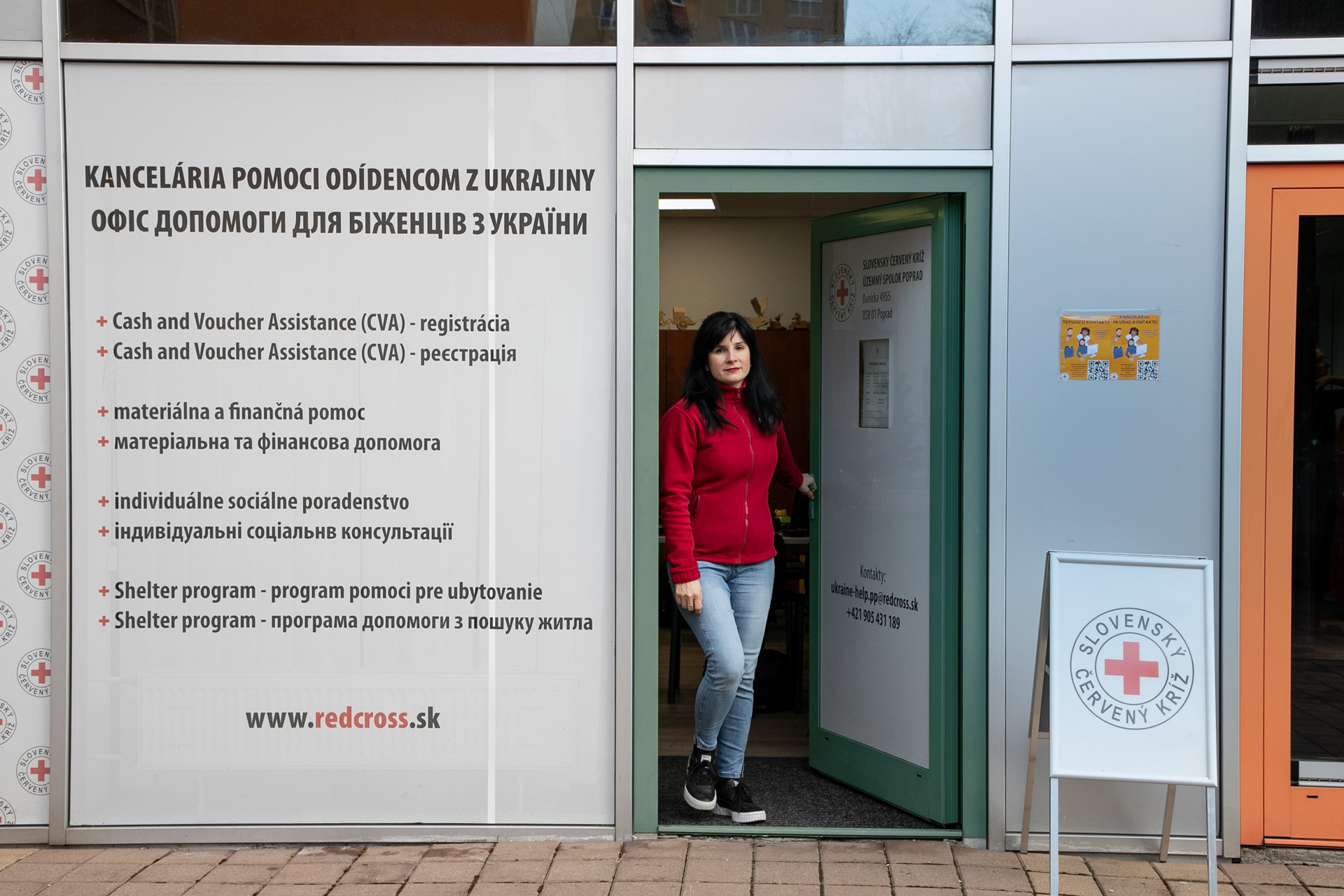HSP Case Study: Slovak Red Cross
Slovak Red Cross
Fixed Humanitarian Service Point
Poprad, Slovakia
August 2022
- Displaced people from Ukraine
- Host community
- Health care (including mental health and psychosocial support)
- Cash and voucher support (including cash for shelter programme)
- Hygiene kits
- Safe referrals
- Information provision
The escalation of the conflict in Ukraine has triggered a fast-growing displacement and humanitarian crisis, pushing millions of people into internal displacement and abroad in search of safety. Almost five million people fleeing the conflict in Ukraine have been registered for protection across Europe, including in neighboring countries such as Hungary, Moldova, Poland, Romania and Slovakia. Slovakia has been confronted with the largest displacement emergency in its history. Before the crisis in Ukraine, Slovakia was mainly a transit country. As of March 2023, over one million migrants and displaced persons had crossed into the country, and more than 110,000 people had been registered as refugees.
Women and children make up the vast majority (84 per cent) of displaced persons from Ukraine, while persons aged 60 and above also constitute a significant proportion (11 per cent). Many people arrive in Slovakia with significant vulnerabilities due to trauma relating to the conflict and their displacement journeys.
Their main humanitarian needs in Slovakia include accommodation, healthcare (including mental health and psychosocial support), livelihoods and basic needs, education and social inclusion, child protection, and support for sexual and gender-based violence.
Following the escalation of conflict in Ukraine, the Slovak Red Cross’ Poprad branch received hundreds of phone calls every day from displaced people from Ukraine arriving at the train station. Displaced people calling the Slovak Red Cross had a variety of queries, relating to access to food, accommodation, healthcare and documentation in Slovakia. The local team responded to these needs with a rapid response, staffing a local 24/7 helpline with Ukrainian volunteer speakers and using the training room of their branch as their base. Staff at the Poprad branch distributed non-food items, created a network of people willing to provide accommodation and support to displaced people, assisted with access to healthcare including basic first aid and transportation to health facilities, school enrolment, and supported people registering to the Red Cross multi-purpose cash assistance programme.
After several months, it became clear to staff at the Poprad branch that the crisis was swiftly becoming long term and the initial temporary response was no longer sufficient to meet people’s needs. These conversations took place in the context of wider discussions at the Slovak Red Cross headquarters, as part of which the small national team had decided to open 15 HSPs across the country where displaced people from Ukraine could access Red Cross assistance and protection. As a result, the initial temporary services in Poprad evolved into a longer-term HSP, forming part of the Slovak Red Cross’ wider national response. Standardization across Red Cross HSPs in Slovakia means that displaced people from Ukraine can maintain access to the same basic services even when they move between cities.
Given the Slovak Red Cross’ ongoing cooperation with government authorities – including as a member of the Crisis Management Board led by the Ministry of Interior – the Poprad branch did not deem it necessary to develop a formal agreement with local authorities to initiate the HSP. Instead, it simply informed the authorities about its services and coordinated with relevant public services to set up safe referral pathways. All staff and volunteers were trained in providing the new services before they were opened.
The Poprad ‘First Contact Desk’ opened in August 2022 in a private building that is easily accessible and very visible in the street. The core team is composed of one social worker, one case worker, a Russian- and Ukrainian-speaking liaison officer, and one administrative staff, while additional volunteers reinforce the team on a more casual basis.
“The Humanitarian Service Point is not just a place where people come to ask something. They also come to socialize, share their news. It’s really creating relationships within the Ukrainian community. Many displaced people from Ukraine are alone and really appreciate the familiar atmosphere that they feel in the place.”
Staff member, Slovak Red Cross
The First Contact Desk provides displaced people from Ukraine with information on how to access legal advice, employment, education and healthcare. The team distributes hygiene kits, organizes safe referrals and provides mental health and psychosocial support. Thanks to the Slovak Red Cross donors, the HSP assists with grocery vouchers.
A cash for shelter’ programme provides financial support to both displaced people to rent private accommodation as well as Slovak hosting families for up to six months. Until January 2023, the Poprad HSP also provided access to the Slovak Red Cross’ multi-purpose cash assistance programme, which started as part of the initial response in May 2022.
The HSP in Poprad also responds to the needs of host community members in vulnerable situations, or people otherwise requiring additional support, for example families hosting displaced people from Ukraine in their homes. This is particularly important in the context of wider-reaching needs among Slovak nationals as a result of the conflict in Ukraine and related displacement. This includes impacts such as high inflation rates, rising energy prices and increased pressures on Slovakia’s housing market.
Slovak Red Cross staff explained that the HSP in Poprad is well-known among the community and other actors and is particularly appreciated as the only point providing such a variety of services in one place. The informal atmosphere, created by its committed staff and volunteer team, and its accessibility103 add to its unique character. Staff explained that displaced people are aware of the Red Cross’ long history and the stability of its services, contributing to a sense that Red Cross assistance is there to stay (compared to smaller initiatives that were born as a result of this crisis and have, in some cases, already disappeared). The Poprad team also noted the extent to which displaced people appear to trust the Red Cross, explaining, “When people see the emblem, it gives them hope.”
Like all HSPs in Slovakia, the Poprad HSP benefits from IFRC support, including with community engagement and accountability measures. In December 2022, it set up a service user feedback mechanism to allow visitors to share their levels of satisfaction with the services and work of staff and volunteers. The satisfaction survey – which is always open on a publicly available laptop – also collects suggestions on potential improvements and accessibility issues. Leaflets with a QR code leading to the survey are also handed out to service users and posted on the walls of the building. As of mid-April 2023, 96 people had responded to the survey. Over 90 per cent of respondents are satisfied or very satisfied with the services and the work of staff and volunteers.
“HSPs are known within the regions. People know they can reach these points. They know that they can ask for help and reach them with their problem, whatever it might be – either with material support, school for children, looking for a job, or social counselling – people know they can reach these points and just get the answer how it can be solved. I think it has a very good impact.”
Staff member, Slovak Red Cross
Again, like all HSPs in Slovakia, Poprad uses the ‘ESPO’ customer relationship management system, run by the 510 initiative hosted by the Netherlands Red Cross to register all cases on a centralized database. This allows the team to easily monitor the number of service users, their needs and the services provided. It also facilitates continuity of care when displaced people from Ukraine move from one region to another in Slovakia and require services in different locations. Since end of October 2022, the Poprad HSP has registered 407 cases, in addition to 105 registrations for the cash for shelter programme.
The standardization of services and systems in all HSPs allows for regular exchanges of information and experiences among HSP teams, contributing to ongoing efforts to strengthen the capacity and quality of services for their users.
Since the creation of HSPs in Slovakia, services have mainly focused on supporting displaced people from Ukraine. But the Slovak Red Cross plans, within the next three to five years, to widen its focus and increase the number of local people benefiting from its assistance and protection. In Poprad, the team foresees services being reintegrated within the local branch, sitting alongside its wider services.
Slovak Red Cross insights
“We are still learning as the situation is evolving”
Slovak Red Cross staff member
It was the first time the Slovak Red Cross had deployed this type (and scale) of emergency humanitarian response. Staff related how much they had learnt during the year, and how much they are still learning every day as the situation unfolds. Today, Slovak Red Cross staff report feeling even more capable of responding to future emergencies, thanks to the training staff and volunteers have undertaken in the past year, and due to the multiple lessons learnt along the way.
“It is not an ordinary job [...] they [staff and volunteers] must have the Principles in their blood”
Slovak Red Cross staff member
When opening HSPs, it can be challenging to find staff and volunteers to run the various services. As noted by the Slovak Red Cross, assisting and protecting displaced people requires a lot of empathy and commitment. Being a qualified social worker or interpreter is not sufficient. Slovak Red Cross staff believe that candidates must not only know and understand the Fundamental Principles of the International Red Cross and Red Crescent Movement, but they must “feel and live them.”
“At HQ, we feel like the field is here with us”
Slovak Red Cross staff member
The creation of an HSP network across Slovakia has reinforced the working relationships between headquarters and local branches, who have been in touch daily throughout the crisis. While working relationships were seen as strong beforehand, they are considered to have improved significantly throughout the crisis response, contributing towards more efficient ways of working. Fortnightly meetings are held with staff from headquarters and all HSPs across Slovakia, allowing participants to share information and daily challenges.



